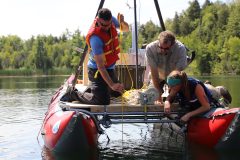- Support increased research funding and sponsorships[1]
- Maximize impact of foundational and applied research
- Improve the dissemination of research with increased promotion of knowledge mobilization, publications and citations
- Enhance opportunities for national and international research collaborations
Support increased research funding and sponsorships[1]
Research across different disciplines requires different funding, services, and facilities to support the work. Two major initiatives include the holistic partnership model with Advancement which amplifies our external voice and provides partners with significant value-added engagements. Secondly, Carleton’s investment in the Advanced Research and Innovation in Smart Environments (ARISE) building is a unique model in Canada that focuses on research partnerships by providing dedicated research and development space for collaborations with governments, not-for-profits, and industry. Growth in research necessitates many of the elements below that facilitate both externally funded and internally sponsored research. This also requires that the university be vigilant of global trends in research security risk.
Overall goal: Exceed our three-year annual rolling external research funding of $75 million through the following activities.
- Streamline research administration processes for the whole life cycle of a research project, including:
- Approval process from academic units, Faculties and the Office of the Vice-President (Research and International)
- Compliance and risk management (human ethics, animal ethics, biosafety) as needed
- Application review and development
- Interface with Research Financial Services and Human Resources
- Post-award support across campus
- Invest in support for researchers to meet the increasing government requirements for commercialization and research security
- Provide improved support to researchers, including:

- Identifying external funding and partnership opportunities
- Research-related information technology support (file sharing, computing, technical support, software development, site licences)
- Funding application development and editing
- Seed funding to initiate new projects and collaborations
- In partnership with the Faculties, expand the cash and in-kind resources available to support applications for large-scale research initiatives.
- Strengthen library services around author rights, open access, research data management, and researcher profiles
- Design special programs to engage specific researchers’ groups, including:
- Early-career researchers
- Mid-career researchers who are no longer fully engaged in research
- Researchers who have been performing administrative duties
- Adjunct Research Professors
- Be more strategic and proactive in external grant applications and partnerships
- Identify strategic external funding opportunities, including multidisciplinary areas
- Leverage relationships with partners from all sectors (governments, community, private sector, health-care
providers and foundations) through partnered-funding opportunities - Continue to expand and support Industry Partnership Services, holistic integrated partnerships, and CU@Kanata
- Co-ordinate our joint communications efforts to improve the quality of our presentations and promote web presence and research strengths
- Expand support to Multidisciplinary Research Clusters by:
- Organizing multidisciplinary research events (e.g., REALISE)
- Providing funding to emerging multidisciplinary research teams through Multidisciplinary Research Catalyst Fund competitions
- Supporting research teams in the areas of wellness, sustainability, and connectivity to support the Strategic Integrated Plan
- Working with the Faculties to provide adequate support to clusters (e.g., Canada Research Chairs, space, new internal research chairs)
- Expand holistic integrated partnership activities
Maximize impact of foundational and applied research
Our award-winning researchers impact disciplines across the spectrum, garnering recognitions such as the Audie Award for Audiobooks, a Juno Award for percussion, the Polanyi Prize in basic cellular signaling or the NSERC Gerhard Herzberg Canada Gold Medal for ground-breaking management of wildlife conservation.
It is critical to communicate the impacts of both foundational and applied research. Some research and scholarship immediately finds its way into practical, public applications, while other research may take years or decades to reveal their impacts. We can facilitate this through deliberate actions.
- Host, support, and participate in major academic initiatives
- Engage end users—including community, industry, and government—in research programs to promote innovation and uptake of the research
- Provide additional support for the commercialization of novel research via innovation transfers for copyright, patents, licensing, open source, and knowledge mobilization activities
- Promote and reward engagement, innovation, and excellence in research by increasing support to the Carleton University Innovation Transfer Office and celebrating external and internal (e.g., Research Achievement Award) award winners
- Support increased intellectual property disclosures from faculty
- Ensure wherever possible that research funding is leveraged to maximize impact
- Leverage our work and analysis though the comprehensive exercise undertaken to map our community engagement activities to involve more foundations and other not-for-profit partners
- Ensure graduate and undergraduate students are engaged in research by supporting their work through fellowships and industry internships (i.e., Ericsson Fellowships), scholarships, community-engaged research and our I-CUREUS program
Improve the dissemination of research with increased promotion of knowledge mobilization, publications and citations
- Tell our research success story more sharply and strategically by
 Establishing a clear process to document and clearly articulate our research strengths and successes
Establishing a clear process to document and clearly articulate our research strengths and successes- Ensuring that printed material, social media, and web presence, including faculty profiles, are co-ordinated in their messaging and promote our strengths and successes
- Emphasizing our proven areas of strength and excellence based, for instance, on significant and consistent funding and partnerships
- Review how knowledge mobilization and publications are counted, especially when published outside of North America and/or in other languages besides English
- Strengthen funding and support for open access publishing to enhance the accessibility, visibility and impact of research undertaken at Carleton
- Raise awareness amongst Carleton researchers of the value of persistent digital identifiers (such as ORCID) in distinguishing and tracking the unique contributions of individuals as authors, researchers, grant-holders, and inventors
- Increase nominations for national and international awards and prizes by identifying opportunities and candidates and optimizing nominations through professional writing and review
- Document our success in research knowledge transfer, publications, and citations more effectively
- Support the Carleton Innovation Transfer Office to offer training and support for researchers on knowledge transfer, technology transfer to industry, commercialization, and patents
Enhance opportunities for national and international research collaborations
- Monitor and evaluate external market conditions and opportunities where Carleton could make a difference
- Capitalize on investments in the United Nations Sustainable Development Goals in areas where Carleton has clear strengths[2]
- Monitor international standards, such as those for data management and research security risk, to ensure research meets and exceeds global standards
- Convene multi-disciplinary groups of researchers to explore thematic strengths (e.g., mental health)
- Reorient internal grant programs as seed investment to increase research productivity with a focus on early-career researchers, bridge funding, multidisciplinary clusters and programs tailored to specific researchers’ groups, such as mid-career researchers
- Support engagements between Carleton faculty and national and international visitors to campus to build collaborations
- In conjunction with finance and purchasing, develop policies and procedures that facilitate national and international research programs
- Utilize the space and assets in our ARISE building to advance and leverage our unique model of partnership along thematic lines of clean tech, health tech, and communications tech
- Expand national and international research collaborations and knowledge exchange
- Support prestigious international programs, such as the Fulbright Canada Distinguished Research Chairs, and actively promote nominations to international fellowships, such as Sloan Research Fellowships and the Guggenheim Fellowship
- Carefully analyze various national and international ranking systems and propose specific actions to improve submissions and rankings
Additional information about Carleton’s activities in this area is available in the International Strategic Plan
[1] Appendix A outlines current areas of research strength.
[2] Appendix B outlines how Carleton’s activities align with the United Nations Sustainable Development Goals.
